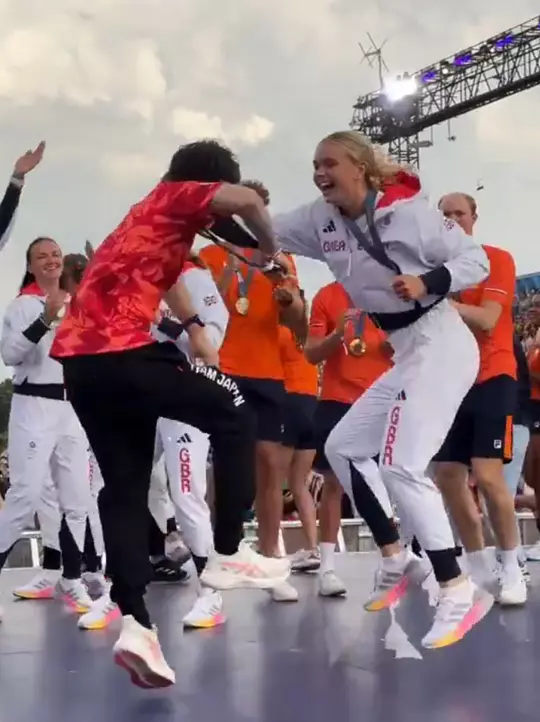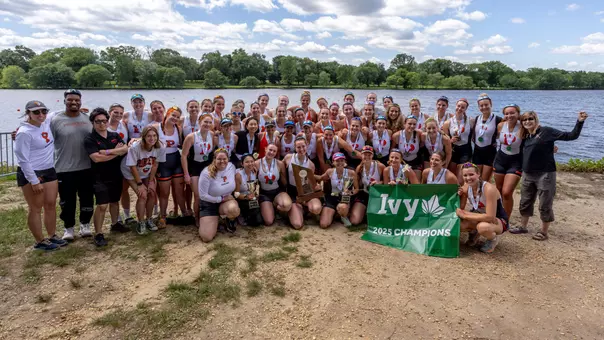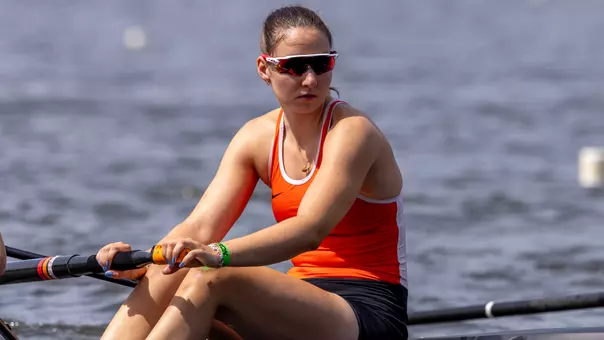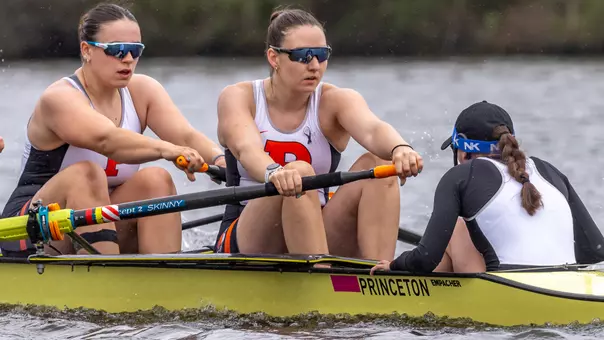Princeton University Athletics
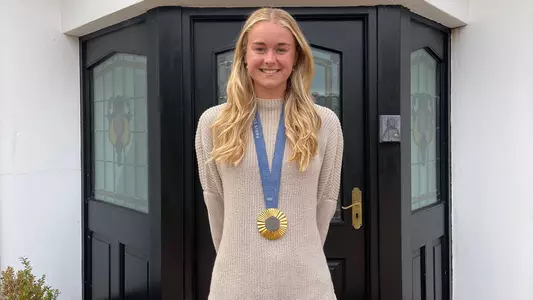
Golden Feature: Hannah Scott
September 04, 2024 | Women's Rowing - Open
First In A Series On Princeton’s Three Paris Gold Medalists.
The River Bann flows northwest through Northern Ireland, passing through the town of Coleraine about seven miles before it reaches the Atlantic Ocean. Belfast is a little more than an hour’s drive away from this town of 25,000, which also is the hometown of Hannah Scott, Princeton Class of 2021.
“It’s an area that’s peaceful,” Scott says as she sits in her parent’s house. A day earlier, the word to describe Coleraine wasn’t “peaceful.” It was anything but.
“Celebratory?” Yes. “Exuberant?” Definitely. “Festive?” Yes.
In fact, more than 1,000 people had turned out in Coleraine to celebrate Scott, who was just off the plane from England, only a few days removed from winning an Olympic gold medal in Paris in the Great Britain boat for quad sculls.
“It was all overwhelming,” she says. “It was just so amazing to see everyone and to feel the emotions. I still haven’t come down from it. I couldn’t have planned anything better for how it all went.”
No, she couldn’t. If she could have, she never would have come up with the storyline that she found herself in on July 31, the day of the quad sculls final. It’s a 2,000-meter race, and Scott’s British boat trailed the boat from the Netherlands for, oh, 1,999.9 of those meters. It wasn’t until the very last stroke that the British somehow nudged ahead, winning the race in a photo finish. It might have been the greatest ending of a rowing race in Olympic history.
“I knew we could do it, but would we do it on that day at that particular time?” she said. “In elite sport, that’s a lot to ask of someone. You have to do it on that day and at that time, and a lot of things can go wrong. After we won it was just sheer disbelief. You can’t really accept that the moment is happening to you.”
From the stands in Paris, her Princeton coach Lori Dauphiny watched in amazement. Dauphiny had seen it all in rowing over and over — or at least she thought she had.
“I haven’t seen many better races,” Dauphiny says. “She had everyone hanging on for dear life in the stands. I was standing with her parents and friends. To me it looked like her mother knew they would win and I told her that later, but she denied any sense of calm. Hannah is a force, and everyone witnessed it with that finish.”
As if winning gold in shocking fashion wasn’t enough, Scott then had her medal presented to her by none other than Princess Anne, daughter of Queen Elizabeth and herself a former Olympian in equestrian. Later on, Scott would find herself dancing with a random Japanese gymnast in front of 12,000 people at the Champions’ Walk. That video would go viral and have more than 10 million views. Ten million.
These were a series of moments that were three years in the making, or maybe more than a dozen. Her trip to the top of the rowing world began in earnest when her “mum” made her look to the west for college opportunities, at a school that she’d only heard of because one of her friends told her “Princeton was a lovely university” and she wanted to see it.
“I met Lori there and, yup …’ Scott says. It’s at once not exactly clear what she meant and 100 percent clear what she meant.
“Lori was huge in my development as a rower,” she says. “With Lori, I saw her respecting her athletes. I really, really loved that. It was authentic. I started to completely love Princeton, and I really trusted her.”
“She’s driven, determined, loyal, stubborn, hardworking, lovable, kind, funny and fun,” Dauphiny says of Scott. “She’s a good friend, and a great teammate to so many.”
That’s where Hannah Scott’s part of this story began, at Princeton with Lori Dauphiny. The bigger picture? That began with an 85-year-old woman and that word that Scott used to describe her hometown: Peaceful.
Oh yeah. Peaceful.
It’s not a word that gets thrown around casually in Northern Ireland.
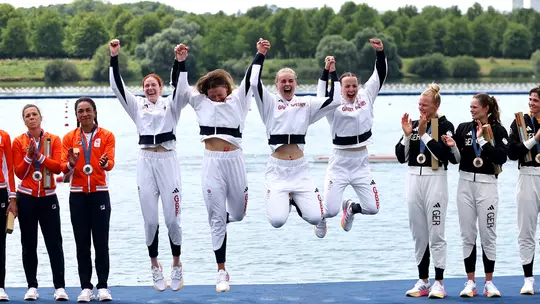
Hannah Scott was a rare rower who made the first varsity 8 boat as a Princeton freshman. She would help power Princeton to the Ivy League titles in 2018 and 2019 — and in all likelihood would have gone four for four had the pandemic not cancelled her junior and senior seasons.
Did her coach see an Olympic gold medalist when Scott came to Princeton?
“I can spot talent and heart,” Dauphiny says. “Hannah clearly had both. Then it takes tremendous commitment, and that is not something you can spot at first glance. I could see Hannah’s drive and determination during her freshman year. I told her dad that I thought he would see her on the podium at the Olympics one day.”
The first chance for that prophesy to come true came in Tokyo in 2021, when she was also in the Great Britain quad sculls. Her first Olympic experience did not go well, as her boat was eliminated from medal contention early and then ended up winning the B final, which meant a seventh-place finish overall.
“Tokyo was rough,” she says. “There were plenty of athletes who probably thought the same way. It was hard to come out of it the way we did. After that, I had a really honest conversation with myself. Is this worth it, all the training, missing weddings, missing birthdays. I didn’t get the result I wanted in Tokyo, and I was very hard on myself. I found it really complicated as I came out of that. The biggest thing was that I had to reset. I decided I didn’t want to give up too soon, so I decided I’d work towards Paris.”
Working in her favor was the fact that it would be only a three-year cycle, since the Tokyo Games were delayed by a year due to the pandemic. With her head and heart now in sync about getting back in 2024, Scott began to work towards making her college coach’s prediction come true. Scott’s B Final race in Tokyo was on July 28, 2021. By September she was back into training, first as a single.
“It was challenging for me in many ways,” she says. “The single is a tough boat to be in, when you’re on the start line and no one else with you. It was rough for me to get my confidence back.”
She’d come in fifth in the single at the 2022 World Championships in Prague, despite dealing with a rib injury before that. She was back into the quad boat for the 2023 World Championships in Belgrade, where she won gold with Lauren Henry, Georgina Brayshaw and Lola Anderson, with whom she would also row in Paris.
Everything would be different this time around for Scott. Instead of having to make their way back through the repechage, the Great Britain rowers blasted their way straight through to the final by winning their heat by two seconds over Germany. That gave them four days to rest and recover before the final, which took place on July 31, just after noon.
“In my head, at the start of the final, I just didn’t want to fear the result,” she says. “Whatever happened, I just wanted to race our best race.”
If she could, and if that would be enough to put them on the top step, then she would do more than make Lori Dauphiny look smart with her prediction.
She’d also make Northern Ireland history.
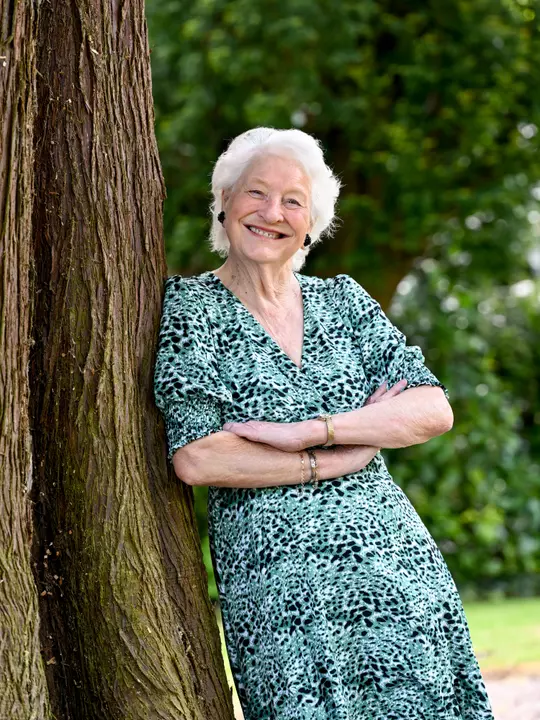
The Zoom screen reveals an empty chair for about 10 seconds. Into the picture then comes a woman who is all smiles.
“Lady Mary?”
“You only call me ‘Lady Mary’ once,” she says, her Northern Irish accent apparent with each word. “After that, you call me ‘Mary P.’ My friends call me ‘Mary P,’ and now you’re my friend."
Mary P is Mary Peters. She is 85 years old — as hard as that is to believe at first meeting. Or maybe not. After all, Mary P was an Olympic gold medalist in 1972, when she became the first athlete from Northern Ireland to win gold.
Her event was the pentathlon, which then consisted of the 110 hurdles, shot put, high jump, long jump and 200-meter run. She finished fourth in Tokyo in 1964 and then missed out on a chance to medal with an ankle injury in 1968 in Mexico City. Her last chance was in Munich in 1972, when she was already 33 years old.
Fueled by wins in the shot put and long jump and a second-place finish in the hurdles, Peters won her gold medal in world record fashion, outdistancing West German runner-up Heidi Rosendahl. In 2022, on the 50th anniversary of their rivalry, Mary P hosted Rosendahl and her husband.
“A local journalist asked Heidi if she had forgiven me for beating her,” Mary P says. “She said ‘no,’ of course. We’re still good friends, which is what sports should be all about.”
She laughs as she tells this story. She laughs as she tells most of her stories. She oozes energy, so much so that it’s not hard to imagine that she could still complete all five of those events in style.
You want to know what really makes her face light up? That would be the mere mention of Hannah Scott.
“She’s so beautiful,” Mary P says. “She is vibrant and exciting, and she’s raised the profile of her sport. She’s going to do so much good in this world. She’s talented, beautiful, intelligent. She’ll be an inspiration to a whole generation here.”
Until Scott came along this year, Mary P was the only woman from Northern Ireland ever to win Olympic gold. The only other Northern Ireland athletes to do so since had been two men’s field hockey players (Jimmy Kirkwood and Stephen Martin) in Seoul in 1988.
When the town of Coleraine turned out to honor Scott, Mary P made sure she was there. And it wasn’t easy to do so.
“I was asked to open a garden in Belfast,” she says. “That was at 2. The celebration for Hannah was at 4, and they asked me if I’d be on stage. We left Belfast at 10 minutes to three. When we got there, a policeman was directing us the wrong way on a one-way street, but we got there. I had met her parents before but never her. We hugged, and both of us were so happy.”
Mary P started a foundation after her Olympic win, the Mary Peters Trust. For the 2024 Games, her trust had helped 27 of the athletes from Northern Ireland on the Great Britain Olympic team in their development.
By the way, do you know which country had the most Olympic gold medalists in Paris per capita? That would be Northern Ireland, who had four golds, a silver and a bronze — the golds came from Scott, Daniel Wiffen in the 800 freestyle in swimming, Jack McMillan in the 200 free relay in swimming and Rhys McClenaghan in the pommel horse in gymnastics.
“How much does it mean to us to have the most gold medalists per capita?” Mary P asks rhetorically. “It’s a joy. It’s extraordinary.”
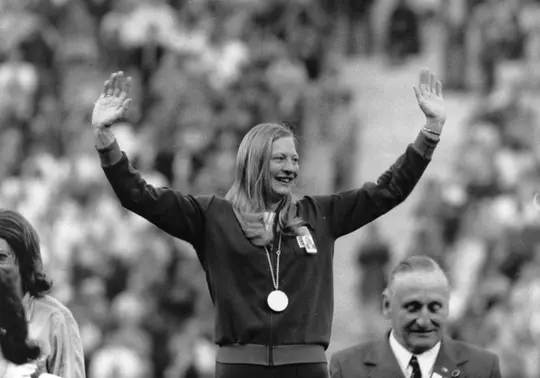
Hannah Scott came back after winning Olympic gold to a ticker-tape parade. Mary P did as well, though hers was much, much different. Peaceful? That’s not how Northern Ireland was in 1972, not during the peak of what is known now, somewhat euphemistically, as “The Troubles.” It was a time of war and death in Northern Ireland, the kind of tragedy that inspired song lyrics such as this U2 classic:
And the battle's just begun
There's many lost, but tell me who has won?
The trenches dug within our hearts
And mothers, children, brothers, sisters torn apart
Sunday, Bloody Sunday
Sunday, Bloody Sunday
The “Bloody Sunday” to which the song refers was Sunday, Jan. 30, 1972, a day when British soldiers killed 26 civilians near Derry, which is about 30 minutes from Coleraine. By then, The Troubles were already a few years old, and by the time the Good Friday Agreement was signed in 1998 to end the conflict between nationalist paramilitary factions like the Irish Republican Army and the British Army and the Protestants and the Catholics, nearly 4,000 were dead and nearly 50,000 were wounded, the overwhelming majority of whom were civilians.
“Everyone in my family lived it,” Scott says. “Even where we are, the divide is still there. A lot of it is emotional trauma that has been passed on and never really healed. The generation above us knew before [The Troubles] and after. Most every family was touched by it. Friends. Family. They didn’t even have to have a connection to an organization. They all had a friend or a family member who was killed, or they were near where a bomb was hidden. And these were small communities.”
Mary Peters was born in Liverpool but moved to Northern Ireland was she was 11. She was a natural athlete, and her experience was rare for a girl at that time. So was her affinity for weight training, which was almost unheard of for women athletes.
“It was very unusual to be a woman athlete then,” Mary P says. “I was lucky enough to have an older brother and then a headmaster at school who was very keen to help us find our niche in life. I think he recognized I wasn’t academically the brightest. He watched me play cricket very badly one day and said ‘come with me. This is the athletics coach. He coaches the boys, but he won’t mind if you joined in.’ One day, the coach asked me if I’d like to try the pentathlon.”
At 18, she began training in Belfast as she studied to become a teacher. After four years of teaching, she gave that up to work full time as her coach’s secretary for 48 hours a week.
“It gave me the chance to train before work or in the evening,” she says. “The only track we could use was full of potholes, so most of my training was done in a gymnasium. I earned a fellowship that sent me to California for six weeks. In Northern Ireland, we have a lot of rain. In California, it was six weeks of sunshine. That was so helpful for me.”
Those obstacles were nothing compared to what was going on around her in her home city.
“Those were the worst years of The Troubles,” she says. “There were three soldiers who were lured to a party next door to my flat, and the IRA shot all three soldiers dead. I heard the shots. You’d be on the bus, and there would be bombs going off in the city.”
The night that Mary P won her gold medal, a call came into the BBC in Munich.
“They said that if I came home to Belfast that I’d be shot and my flat would be bombed,” she says. “We had a party in Munich the following evening, and I saw my father, who lived in Australia, and my coach having a conversation. I said ‘what’s happening’ and they said ‘nothing you need to worry about.’ I told them that I was going home to Belfast. I wasn’t going to Australia.”
She did go back to Belfast, though it would be several months before she could return to her flat. For her victory parade, she was on a truck — a heavily guarded truck. That was a Friday. She was back to work Monday.
“You live your life as it is,” she says. “It was a very disturbing time. When I see documentaries about The Troubles now, it’s harder to take. You’re not as aware as you’re living through it.”
She lived through it, full of life, full of bravery. She then started her Trust and has devoted her life to helping others, including Hannah Scott.
“It was quite a big deal to meet her,” Scott says of Mary P. “It was so exciting. She’s an amazing woman. She’s a legend in Northern Ireland, and she came to my homecoming. Do you know how incredible that is?”
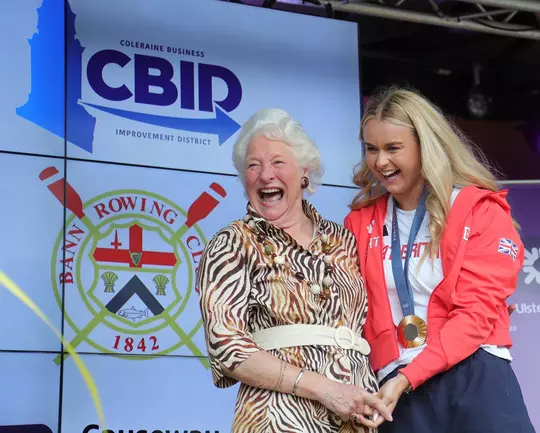
The women’s quad scullers from Great Britain drew Lane 4 for the 2024 Olympic final. To their left for the 2,000 meters would be the boat from the Netherlands. Actually, you can make that “to their left and a bit ahead of them.” That’s how the race started. That’s how it continued.
If you look at the splits, you'll see that the Netherlands led by 1.31 seconds after 500 meters, 1.16 seconds after 1,000 and 1.10 seconds after 1,500. Even with only a few meters left, the Netherlands boat was still ahead.
The British, for their part, were in fourth place after 200 meters, trailing the Netherlands, Ukraine and China. At 500 meters, the British were third, having passed Ukraine. At the halftime point of 1,000 meters, it was the Netherlands in first and the British in second.
At this point, it was pretty clear that barring something disastrous, Hannah Scott and her boatmates were going to win a medal.
“I was telling myself that if we won a medal, don’t be disappointed by the color,” she says. “The entire race, I felt comfortable where we were the entire race. I wasn’t panicking. I had faith that we’d break through eventually.”
Of course, that was easy to say after the fact. In the moment? It hardly seemed like the British had a chance, even with 200 meters to go. The Dutch still had the lead as the boats passed the final red buoys. And then?
“Well, we were waiting for our moment,” Scott says. “Turns out, it came later than I thought.”
It wasn’t until the British were able to take one last lunging stroke that their boat just pushed ahead of the Netherlands. It was extraordinary. There was no way the British had made up that much ground in that little time, was there?
“In your heart of hearts, you want gold,” Scott says. “That’s the thing about photo finishes. When we crossed the line, my first thought was ‘is it gold?’ When I realized it was, a lot of it was relief. I knew we could do it. Would we do it on that particular day at that particular time?”
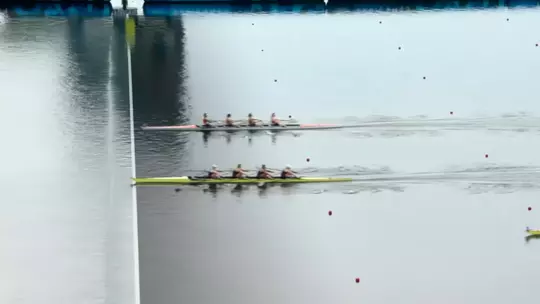
Princess Anne is the younger sister of King Charles III. She was an accomplished equestrian athlete, one who won a gold medal and two silvers at the European Championships and who competed for Great Britain at the 1976 Olympic Games in Montreal, where she rode a horse of her mother’s, Queen Elizabeth II. The Princess was asked to be a presenter of the medals for the women’s quad sculls in Paris, largely because it was thought that the British had a chance to win.
“When she saw us on the podium, the first thing she said was ‘that was a little close for my liking,’” Scott says.
The Princess had spoken to the British athletes at the embassy before the games. Her words really hit home for Scott.
“She said ‘if this is your first Games, don’t be too hard on yourself if it doesn’t go well,’” Scott says. “That was something I could relate to. She was really nice. She has a very dry sense of humor.”
So what does a gold medalist do for the rest of the Olympics? In Scott’s case, it was a whirlwind of media engagements, touring in Paris, watching other events — and dancing at the Champions’ Walk.
“We get to walk down a catwalk by the Eiffel Tower,” Scott says. “There was an American canoeist who won bronze. There were athletes from Germany and the Netherlands. We were there. The Japanese gymnasts. There was music playing. It was sort of awkward, so I said that we had to dance.”
The person closest to her when she said this was Japanese gymnast Shinnosuke Oka, who won three gold medals — including the individual all-around, and one bronze.
“We didn’t speak at all,” she says. “We didn’t realize what it looked like until we saw the video. That’s what the Olympics are supposed to be about. It was great to be able to share that moment with athletes from other countries.”
For the Closing Ceremonies, Scott once again found herself in the right place at the right time. This time, she happened to be standing next to where Tom Cruise landed as he parachuted into the stadium.
Gold medal? Check.
Viral dance video? Check.
Close up video of Tom Cruise on her phone? Check.
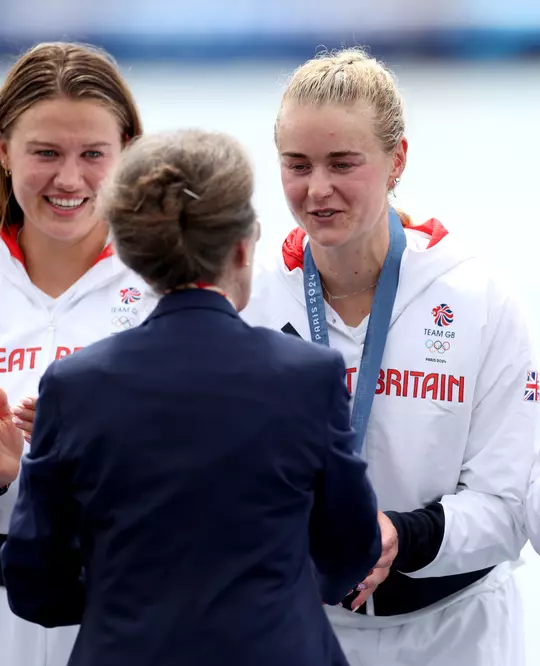
Hannah Scott will be 29 years old when the Los Angeles Olympic Games begin in 2028. Will she commit to another cycle?
“I love rowing a lot now,” she says. “To stop would be a shame, but rowing is hard and demands a lot daily.”
Eventually, she will hang up the oars. What’s after that for her? It could be a normal, peaceful 9-5 job, with a chance to “live and breathe a bit,” as she says. She has a passion for women’s health and women’s athletics, and she might look to combine those two in some ways.
For now, she is still dealing with the aftermath of the events of the 2024 Paris Olympic Games.
“I don’t think I’ve fully taken it all in yet,” she says. “I think there’s almost a sense of denial that it happened. I dreamt about it for so long. But I’m still just me. I’m at home. It’s normal.”
But?
“But what?”
“But you’ll always be an Olympic gold medalist, no matter what else ever happens to you.”
She didn’t say anything to that. She didn’t have to say a word.
Her smile did the talking for her.
— by Jerry Price
Next week: Nick Mead
